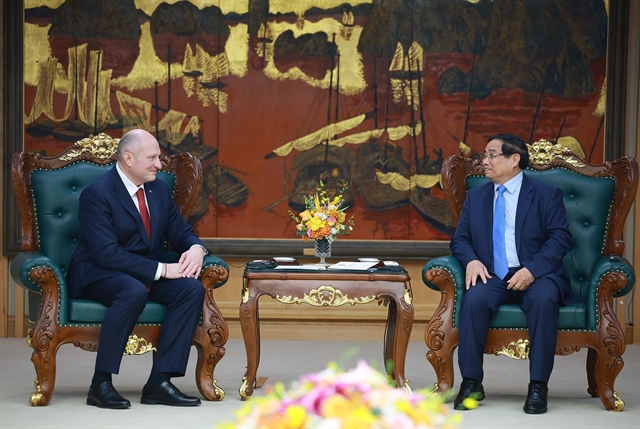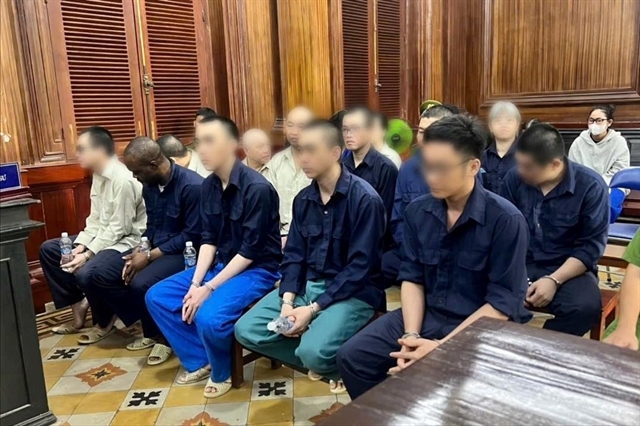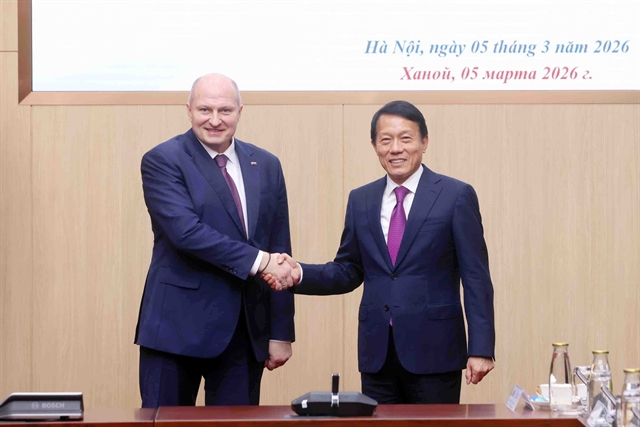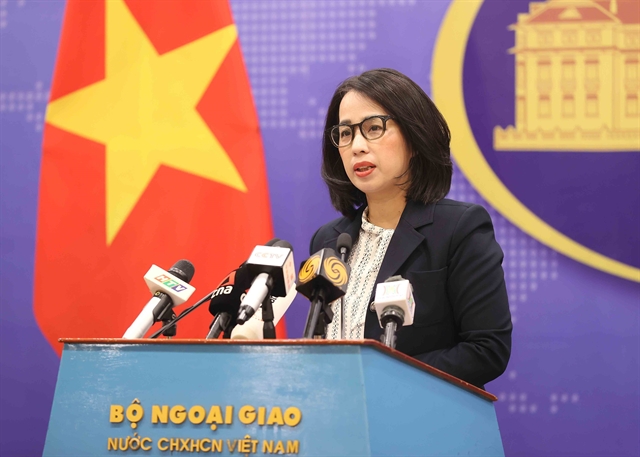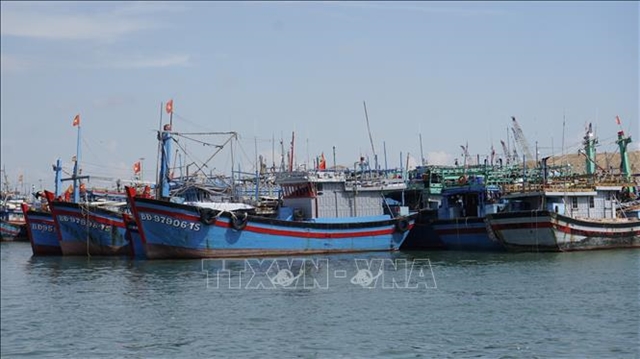 Society
Society
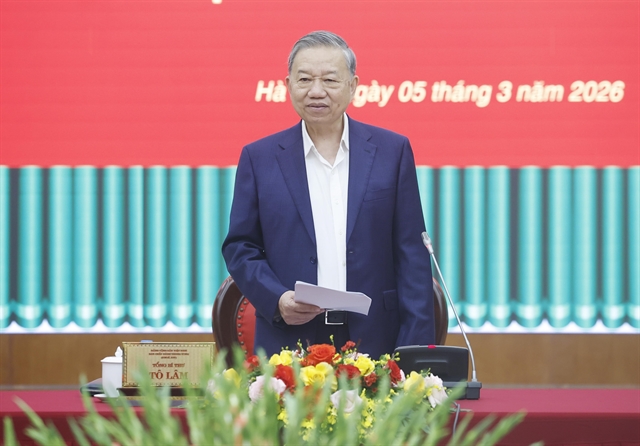
Nguyễn Khánh Chi
Farmer Nguyễn Đình Thiên planted the first 100 cacao trees in 2007, determined to build a stable livelihood for his family. Over the years, his farm expanded to nearly 500 trees, but unpredictable market shifts often threatened his hard-earned success.
Like many other farmers, he found that sustainable growth wasn’t just about perseverance – it required guidance from agricultural experts and partnerships with businesses that could help navigate market uncertainties.
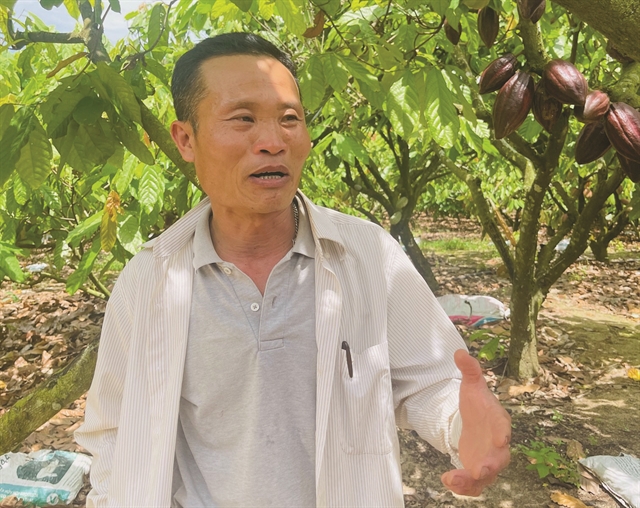 |
| Farmer Nguyễn Đình Thiên, head of Đồng Tiến Cooperative in Eakar District, in the Central Highlands province of Đắk Lắk. VNS Photo Nguyễn Khánh Chi |
“Before establishing the cooperative and joining the supply chain, the market was unstable. There were no commitments from purchasers, no standardised production and prices fluctuated unpredictably,” said Thiên, who is also head of Đồng Tiến Cooperative in Eakar District, in the Central Highlands province of Đắk Lắk.
Things changed when Thiên and a group of farmers decided to establish their own cooperative in 2012.
"The reason for the most stable output is that farmers and cooperatives can connect with businesses for guaranteed purchase and consumption. This forms a three-party collaboration, starting from the production source, which means there is origin traceability," he said.
He noted that in 2025, the price of fresh cocoa beans had surpassed VNĐ80,000 (US$3) per kilogram, with expectations of further increases due to existing contracts that the cooperative’s buyers secured with major European consumption markets.
With 120ha under cocoa cultivation, yielding approximately 300 tonnes of cocoa beans, the Đồng Tiến Cooperative primarily supplies cocoa – whether in whole buds, fresh beans, or fermented form – to Puratos Grand-Place Indochina (PGPI) and Maison Marou Vietnam.
PGPI, a joint venture between Puratos Group and Grand-Place Holding, traces its origins to Belgium and made its first investment in Việt Nam more than 20 years ago. Meanwhile, Maison Marou, a gourmet Vietnamese chocolate company headquartered in Hồ Chí Minh City, was founded in 2011 by Samuel Maruta and Vincent Mourou.
Expert guidance
Along with stable purchasing commitments, the Cooperative’s 80 member households have also received technical training from the Đắk Lắk-based Community Development Centre, Helvetas Vietnam and even big purchasers like Puratos to support their transition towards green and sustainable practices.
“The shift towards a circular approach is driven by the requirement for products exported to Europe to meet green standards, as this circularity is essential for reducing CO2 emissions,” Thiên said.
“As head of the cooperative, I require training to ensure our products meet export standards, Vietnamese standards, and any other criteria that best serve the cooperative.”
When exporting to Europe, if a product from a single member or producer within a shipment fails to meet the standards, the entire shipment of exports could be rejected.
"The challenges posed by European standards are that each farmer must have a unique cultivation area code, they must meticulously follow the prescribed cultivation processes without any omissions, and each farm plot/orchard must be clearly identified," Thiên said.
"Currently, when products reach the end consumer, they carry a code, enabling people to know the origin of that shipment."
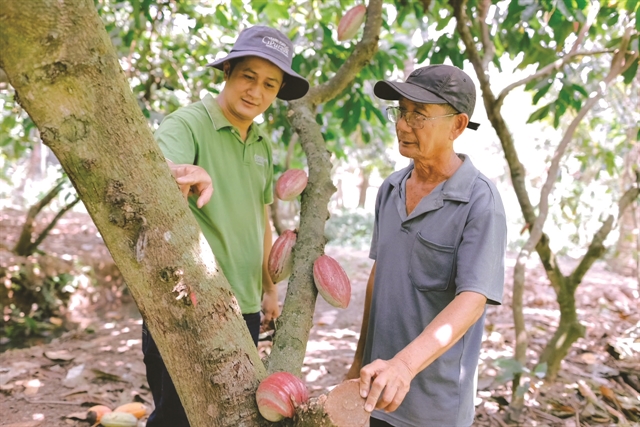 |
| A staff member from Puratos (left) is providing cocoa tree-tending techniques to a local farmer in Đắk Lắk Province. Photo courtesy of Puratos Grand-Place |
Võ Anh Tuấn, Vietnam Cocoa purchasing manager at Puratos Grand-Place Indochina, said the company provided technical support for cacao cultivation and care.
"When implementing the support project, we then sign an offtake agreement to purchase products and guarantee a minimum output price. Concurrently, there is a seedling support programme for farmers, implemented in collaboration with a third party."
Puratos provides technical support through a dedicated team, with staff assigned to each locality and province. Farmers can reach out to them by phone, or through Zalo and Facebook farmers’ community groups for assistance with yield, pest, or disease management.
Alongside technical support, Puratos implements an annual 'Chocolate Bonus' programme for farmers based on the quantity of their output sold to the company.
Additionally, according to Tuấn, the Cacao Trace scheme is a sustainable cocoa sourcing initiative created by Puratos General Director Gricha Safarian.
The initiative was born out of a major, persistent problem: the highly skewed profit-sharing in the chocolate and cocoa supply chain, where farmers receive a disproportionately small percentage. Of the total profit from chocolate products sold, only 5-6 per cent is shared with the farmers.
Consequently, they felt unmotivated to develop cocoa cultivation areas, often cutting down cocoa trees to plant other crops to sustain their livelihoods.
Safarian considered what could be done to develop cocoa-growing regions more sustainably. He initiated Cacao Trace with the aim of creating chocolate products with superior flavour and greater value, which could then be sold on the market at a higher price than other chocolate brands.
“This price difference, instead of going into the company's pockets or funds, is used for value sharing, and paying a bonus to the farmers. This bonus is in addition to the payment they receive through the commitment to purchase their cocoa at a higher price or at a guaranteed minimum market price," Tuấn explained.
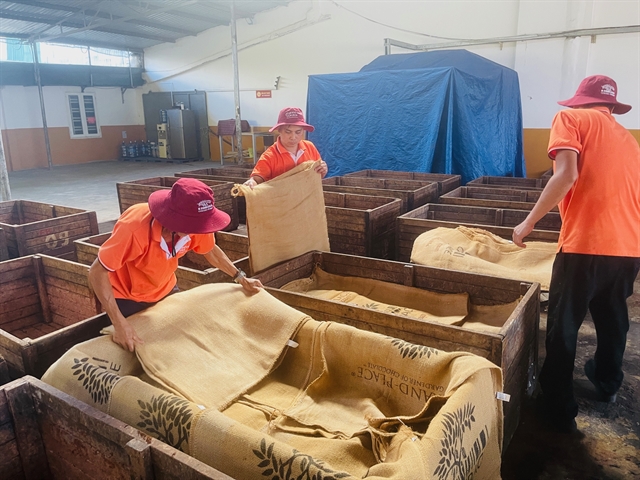 |
| Cocoa beans are fermented at a Puratos facility in the Central Highlands province of Đắk Lắk. VNS Photo Khánh Chi |
When Puratos buys cocoa beans, produces chocolate, and sells it to European and Asian markets, the company dedicates a portion of the profit to share back with the farmers.
"This is 10 cents per kilogram, which is like a token of appreciation from the customers. The company sends this money to the farmers on behalf of the customers,” he said.
This bonus is typically awarded annually in June. This means that when farmers sell to Puratos, the quantity is recorded, and after one year, the bonus is distributed. In 2024, the company paid out approximately $3.58 million in bonuses globally, with Việt Nam's share being around $110,000.
For farmers like Thiên, who sold one tonne of roasted cocoa beans to Puratos, he received a bonus of VNĐ3.6 million (nearly $140) in 2024 alone.
In addition to training on cultivation techniques and traceability, Thiên is also expanding his knowledge by researching and learning more about techniques for processing cacao byproducts given a considerable amount of this waste.
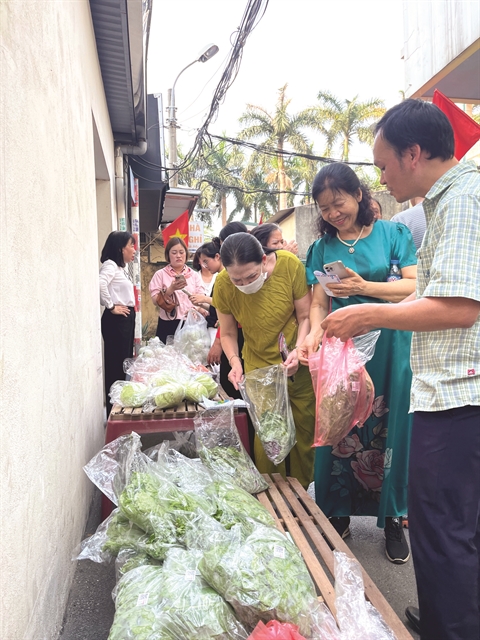 |
| Đồng Đạo Dũng (right) is speaking about the organic farming techniques for local residents in Cầu Giấy District, Hà Nội. VNS Photo Khánh Chi |
Go sustainable, go organic
On a Sunday afternoon, Đồng Đạo Dũng, lecturer from the Hanoi School of Business Management at the Vietnam National University Hanoi, couldn’t hide his joy when sealed bags of organic vegetables grown by farmers in Hòa Bình Province were directly delivered to households in Cầu Giấy District of Hà Nội.
As usual, like other sources, vegetables from the Đồng Sương Organic Vegetable Cooperative are sold to individual customers through groceries.
He spoke of the 12-year journey accompanying farmers to shift their mindset towards chemical-free production, driven by efforts and even struggles from the farmers themselves.
“Previously, farmers had never practised organic farming and believed that without spraying pesticides, it would be ineffective. It took us a whole year of training and analysis to show them which farming practices were scientifically and technically incorrect. Raising awareness about health issues gradually helped farmers recognise the limitations and shift towards organic farming,” Dũng said.
“Organic farming initially results in lower yields because pesticides are not used, leading to increased pest infestations. Even when quality is ensured, the process demands excessive labour, as farmers must manually remove pests one by one.”
Đồng Sương is one of three cooperatives that have successfully implemented the Participatory Guarantee System (PGS) in growing organic farms.
PGS certification is granted to farmers who produce goods in compliance with the proper procedures and regulations for organic production under PGS standards. PGS is developed based on the organic agricultural production standards issued by the Ministry of Agriculture and Environment, ensuring the participation of small-scale farmers in the production process.
“Vietnamese and international scientists have collaborated to address this issue, as it is a global concern. We have partnered with scientists and experts from Spain, Japan and Switzerland to provide training and technical support, helping farmers change to new production models,” said Dũng.
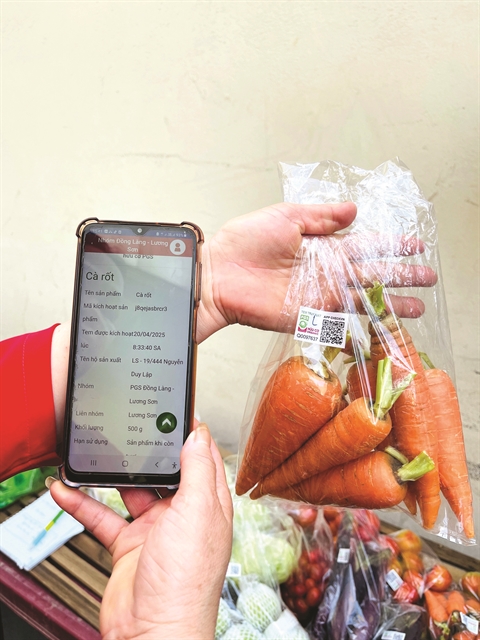 |
| A consumer scans QR code for traceability of carrots grown by Đồng Sương Cooperative. VNS Photo Khánh Chi |
The experts have supported farmers not only in production but also in gaining market access. Notably, they have leveraged technology to develop traceability systems, integrating QR codes on each bag of vegetables to align with consumer preferences.
“As for market solutions, aside from contracting enterprises, we also help farmers explore alternative distribution channels such as major supermarket chains like Big C and Aeon, as well as direct community networks,” said Dũng.
An integral element of sustainable agriculture is the greening of the fertiliser industry.
According to Phùng Hà, PhD, chairman of the Fertiliser Association of Vietnam, agriculture is not only affected by climate change but is also the second-largest emitter of greenhouse gases, particularly from fertiliser production and use, pesticide application, and rice cultivation.
“Therefore, businesses must take the lead in reducing such emissions by developing next-generation fertilisers, applying biotechnology and organic solutions, aiming to protect the environment while simultaneously enhancing productivity,” he told a recent conference on businesses accompanying farmers in sustainability.
Mai Quang Vinh, PhD, director of the Institute of Green Technology and director of the Centre for Development and Integration, emphasised the role of science, technology, and institutional frameworks in the green and digital transformation of the agroforestry sector.
He proposed that the General Council of Agriculture and Rural Development Vietnam should enhance awareness and practical application of green transformation among cooperatives.
Simultaneously, he called on ministries and relevant agencies to establish mechanisms (or regulatory frameworks) to promote technological application, achieve net zero standards, certify carbon credits, and implement Vietnamese eco-labelling.
“The application of digital technology in production management, traceability, and market connectivity is a crucial factor, particularly in light of Việt Nam's net zero commitments and its international integration efforts from 2028 onwards," he was quoted as saying by the Government News.
These “going organic” approaches align with the Government's increasing encouragement of organic farming and sustainable development that does not harm the environment while reducing emissions.
During a working session with the General Council of Agriculture and Rural Development Vietnam, Deputy Prime Minister Trần Hồng Hà emphasised the role and importance of collaboration among stakeholders in building a sustainable, modern, and environmentally friendly agricultural sector that is adaptable to climate change.
He highlighted the need to establish value chain linkages between farmers, businesses, and markets to withstand uncertainties and risks related to weather and market fluctuations.
The Deputy Prime Minister also called for the transfer and application of scientific and technological advancements through stronger connections between enterprises and farmers.
The National Organic Agriculture Development Project towards 2030 is rooted in practical realities and methods, and aims to enhance value-added agriculture and promote sustainable development.
The initiative seeks to implement national target programmes while leveraging the organic agriculture potential of various regions and localities.
It also contributes to positioning and elevating the brand of Vietnamese agricultural products on the global agricultural map. VNS

